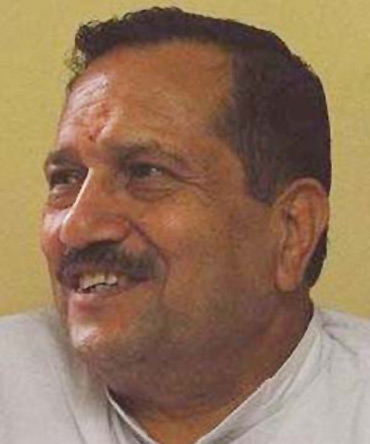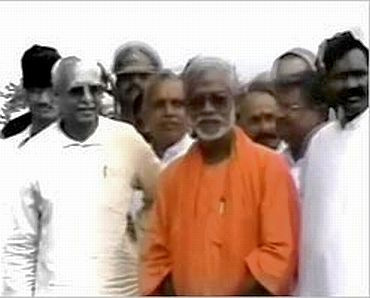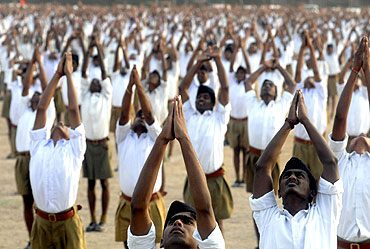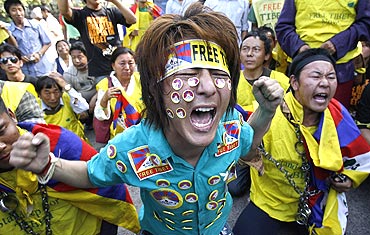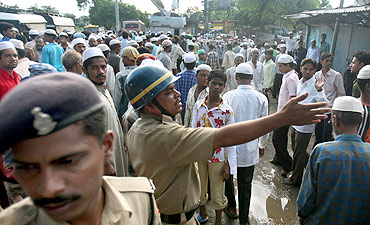 | « Back to article | Print this article |
Terror-stained Indresh Kumar speaks out
Sheela Bhatt in an exclusive chat with Rashtriya Swayamsevak Sangha leader Indresh Kumar, tries to get to know the man who is under the national scanner for serious, but, so far unsubstantiated, allegations of mentoring a group of terrorists.
There cannot be more horrifying crimes than to kill innocent people through bomb blasts.
Rashtriya Swayamsevak Sangh's National Executive's member Indresh Kumar, 62, has been grilled by the Central Bureau of Investigation in connection with bomb blasts in Malegaon, Ajmer, Hyderabad and the Samjhauta Express.
The questioning of RSS's top functionary has created crisis of credibility for the sangh parivar.
It's no less sensational that around a dozen Hindu accused of these re-investigated blasts cases once belonged to the RSS or they were closely linked with it.
Even RSS chief Mohan Bhagwat admitted it recently in Surat, when he said, "Of the majority of the people whom the government has accused, a few have left voluntarily and a few (have been) told by the sangh: 'this extremism will not work here, so you go away'."
Indresh Kumar is not an accused yet but the repeated mention of his name in the recently leaked confession of accused Swami Aseemanand has put the entire sangh parivar on the defensive.
However, the agencies investigating cases of terrorism face a bigger crisis of credibility than the so-called followers of the 'saffron' ideology. The crimes confessed by Aseemanand have been already confessed before by Safdar Nagori, a Students Islamic Movement of India activist, in 2008.
The RSS and the Bharatiya Janata Party's main defence is that investigative agencies are doing the dirty work of the Congress party. At same time, neither the BJP nor the RSS leadership deny in off the record conversations that a small group of radical Hindus may have been involved in "one or two blasts".
At the same time, they say the fringe elements, mainly consisting of former pracharaks of the RSS, have withered away or lost destructive capacity after arrests of some key people and the December 2007 murder of Sunil Joshi, main accused of these terror -related cases.
Please click NEXT to read further..
Watch out for part two in which Indresh Kumar defends himself of terror charges.
Govt trying to deflect attention from corruption charges: BJP
The RSS and BJP leadership are vociferously asking investigative agencies to zero in on these fringe elements who, they claim, are also against leadership of the BJP and the RSS.
One of India's senior most officers handling security matters told rediff.com that, "Those who have been arrested are also fighting amongst themselves. They are incoherent."
The first group that was arrested in Malegaon case that included Sadhvi Pragnya Singh Thakur had alleged that Bhagwat and Indresh Kumar were receiving money from Pakistan's Inter-Services Intelligence.
In fact, BJP chief Nitin Gadkari has been claiming since the last 18 months how slain Maharashtra Anti-Terrorism Squad chief Hemant Karkare had briefed him about the threats faced by Bhagwat and Indresh Kumar from these Hindutva fringe elements.
The same information has been acknowledged by Congress leader Digvijay Singh in his interview to Frontline magazine in July-August, 2010.
Most of the arrested right-wing accused are bad-mouthing the BJP leadership's pro-power politics and the RSS's soft approach on nationalist issues, particularly their softening approach to issues related to China and Pakistan.
In fact, a close reading of Assemanand's confession in court under section 164 suggests that most of the significant allegations made will be very difficult to sustain with corroborative proof because the main accused Sunil Joshi is no more.
Since Aseemanand's confession was leaked out prematurely some experts believed that the agency has no hope to getting a dramatic breakthrough in the investigation so interested parties are using it for political purposes.
One doesn't know if the bigger design or real mastermind behind the so-called saffron terrorism will come to light or not. Assemanand's confession may prove useful for a limited legal purpose depending on the court's assessment in the long run.
In fact, it's too smartly drafted. It levels serious charges but these will be difficult to prove without Joshi.
The sangh parivar alleges that the tremendous pressure the beleaguered United Progressive Alliance government is facing is forcing it to target them.
They claim that government is raking up issue of 'saffron terrorism' to divert attention from charges of corruption and price rise. While Congressmen see the unfolding investigation as the proof of RSS's 'communal agenda' against the minorities which can lead to civil war-like situation if not fought at an ideological level.
The RSS and the BJP are trying hard to retain their credibility regarding their stand vis-a-vis the larger issue of terrorism. Therefore, both are treading carefully on the issue and have unambiguously declared that radicals have no place in their parivar. Until the investigation reaches its logical conclusion one would not know the larger impact on the support base of sangh parivar.
Rediff.com spoke to Indresh Kumar, the man facing the needle of suspicion, to know his side of story.
Kumar, an RSS leader with 40 years of organisational experience is, obviously, under tremendous pressure. He tried to avoid crucial questions related to the case but in an exclusive conversation, he talked about himself, his worldview and activities.
What is important here is that in the RSS set-up he is not insignificant. It takes years of hard work to reach national executive of RSS. He is the man who is revered by even BJP's leaders and workers.
When BJP chief Gadkari meets Indresh Kumar he invariably touches his feet.
Click next to read the full interview
'It's a criminal thought to call Bharat as India'
We would like to know about you a little bit. Where did you study and how did you join the RSS?
I was born on February 18, 1949, in Kaithal, Haryana. My father was a businessman. Since childhood I used to visit the RSS shakha along with my father. I got an engineering degree from Punjab University. I used to participate in RSS activities and in 1970 I became a pracharak.
What was your motivation to join the RSS?
Somewhere in my mind a thought was instilled by my family, society and the RSS that we should do something for society and our country. The basic parameter of doing that was that one should rise above caste, creed, sect and religion.
Caste may remain but casteism is wrong. The sects may continue but sectarianism should be unacceptable. It's very wrong to believe in untouchability.
Our aim should be that society should be united and it should carry strong passion of nationalism. Our unity doesn't mean that your and mine identity will vanish. It's a crime to indulge in identity-based politics and quarrel. This was the basic thought.
Some call this thought the idea of 'Hindu unity' some label it 'cultural nationalism'. Some call it the idea for Indian unity. I don't use the word Indian. The origin of word India is not old. The word came about some two-three centuries back. Any literature, which is 500 years old, won't find the word India in it.
Therefore, I believe, it's a criminal thought to call Bharat and Bhartiya as India and Indians. I am saying this because to cut off our past is a kind of crime. I always use people, never India. In any language Bharat should be Bharat. You may call it Hindustan. In our ancient texts you will find mention of Bharat.
Which was your first job?
I never had a job. I became a full time worker of RSS. I was busy in organisation in New Delhi. I only wanted to do something for our country.
In the last 40 years, like many of us, I performed the RSS's main job of managing shakhas and building human resources. When, under Indira Gandhi's leadership, the Congress murdered democracy I worked hard to fight it along with stalwarts of our organisation. I believe, I played a role in re-establishing democracy in our country at that time. I was underground and was listed amongst the wanted people.
I used to work a lot with students in New Delhi. In 1979, New Delhi was devastated by floods. I had led the entire relief operation of the RSS.
My first big assignment was to rehabilitate lakhs of Kashmiri pundits and a few Kashmiri Muslims in different parts of India. As you know, approximately 55,000 families have been displaced from Kashmir. We worked with the Jammu and Kashmir Sahayta Samiti to re-settle around 4 lakh Kashmiris.
'To support China's stand on Tibet is against humanity'
Which were your other major assignments?
When I went to Ladakh, I started a Hindu-Buddha dialogue around 1986/87. The idea was to establish closeness with Himalaya-based Buddhists. We wanted to join and work together. At that time I came in close touch with the respected Dalai Lama and supported the Tibet movement. Tibet was never a part and parcel of China.
That's why Chinese and those supporters of China in India used to remain upset with me. They used to tell me that Tibet is a dead issue and I was trying to inject oxygen into it.
Do you still believe in this idea? As you know, India has accepted that Tibet is a part of China.
I still believe in it. Just because the Indian government is supporting doesn't mean that I should support it, too. You may be supporting China. It's unfortunate. To support China's stand on Tibet is against humanity, it's dishonesty with the Dalai Lama and it's deception with the people of Tibet.
There are no documents to prove that Tibet was part and parcel of China. Tibet is not shown as part of China in the books of China which are 200 years old.
Today's publications do claim it but none of old books show Tibet as a part of China. When Atalji (former prime minister Atal Bihari Vajpayee) went to China, when Prime Minister Manmohan Singh went to China I had written to them that Bharat has made a mistake in accepting Tibet as a part of China and Bharat should correct the mistake.
These are not my views. The RSS has passed a resolution to this effect. The RSS's second chief Guru Golwalkarji had said at that time that Bharat is making a big mistake in accepting Tibet as a part of China. We are cheating history and truth, both.
Click next to read more
'I began a dialogue with the Muslims'
Who was your ideal when you were young?
I never had one. I was inspired by Sangh. I am a believer of God.
How do you want to be recognised?
I am Hindu and Bhartiya. I think Hindu and Bhartiya, the two words have identical meaning (samanarthi). There is no difference between the two.
You were also involved in friendship between Hindus and Muslims, right?
Since beginning I have believed that all of us are one and we have emerged from one Bhagwan (God), from one earth and we belong to one nation. We have the same ancestors.
In Bharat, 99 percent Muslims and Christians are converted from Hinduism. Meaning our roots are same and we can't be parted. When we can't be parted then it's necessary that we get united, remain united. Our politicians want to see us divided.
We conducted a dialogue with the Muslims. In 2002, they started an institution. The umbrella organisation is called Muslim Rashtriya Manch. It's for the Muslims, by the Muslims. I am an inspiration for them. They are gentlemen and quite active people. The RSS told me to conduct such dialogue.
How did you conduct that dialogue?
I met (noted Islamic scholar) Maulana Wahiduddin Khan, Maulana Ilyasi of the All Indian Imams Organisation. I have met head of Ajmer Sharief and even chief of the Deoband seminary. I have met leaders belonging to Jamait Ulema-e Hind.
I have met quite a lot ordinary Muslims. I think they have not got benefits of education. They have been little bit cut off from wave of patriotism (vatanprasati ke daur se thode se kate rahe hai).
What do you mean by that?
Like to sing songs of people who have sacrificed lives for our country. Like celebrating anniversaries of our national heroes. Our politicians have taught them to hate Hindus, to keep away from Hindus. Leaders have used them for political purposes. While talking to ordinary Muslims I came to know their problems.
I saw that politicians have given them the wrong outlook to see things. Like these days it's believed that if you pardon terrorists then Muslims will be happy. Muslims are exasperated by this.
If government pardons Afzal Guru or Ajmal Kasab then we are told Muslims would be happy. We are told that if Digvijay Singh visits the home of terrorists then Muslims would be happy. The Muslim community is very upset about this perception.
You are saying you have met chief of the Ajmer dargah and now Assemanand confession contains the allegation that you mentored and financed the bombing in Ajmer. What do you think of it?
What do you think of it? How would you find it?
Watch out for part two in which Indresh Kumar defends himself of terror charges.
